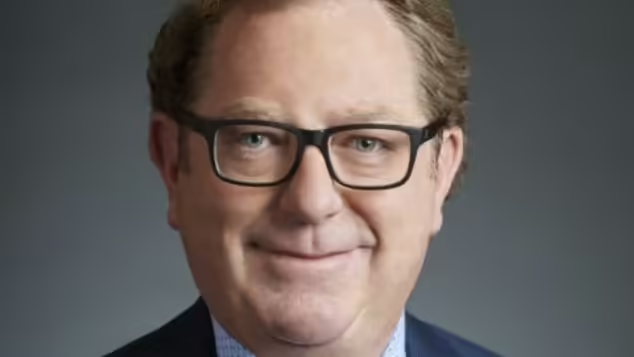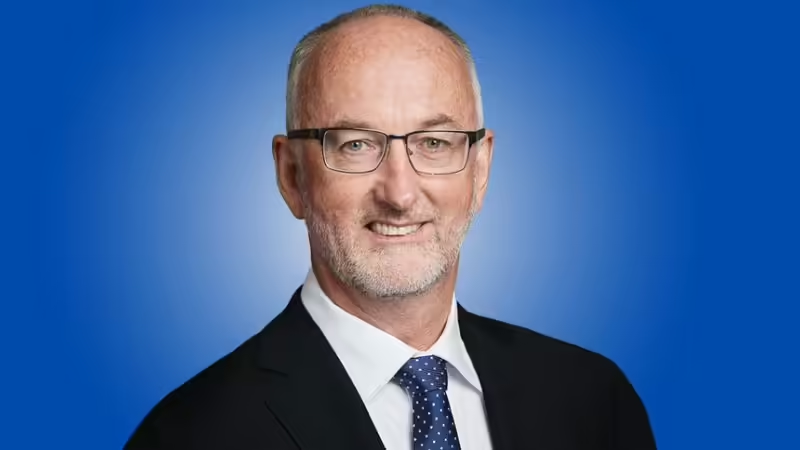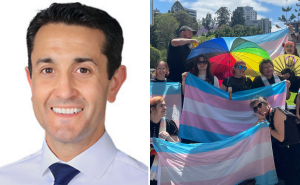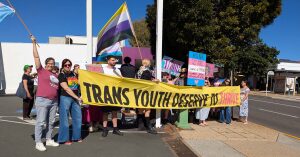The debate over the legislation which will remove Western Australia’s Gender Reassignment Board is continuing in the Legislative Assembly as attempts to push the bill off for deeper investigation by a parliamentary committee fail.
The Births, Deaths and Marriages Registration Amendment (Sex or Gender Changes) Bill 2024 will remove the board and replace it with a new process that will make it easier for people to change their gender on official documents.
– Advertisement –
Labor vowed to change the process in 2017 but are only now pushing the legislation through parliament as the head towards the end of their second term. The legislation is being opposed by the Liberal party and One Nation, while Nationals members have been granted a conscience vote on the issue.
As the Legislative Council met for the first time on Tuesday following their long winter break transgender health care and the processes for allowing people to change their gender were much discussed issues that extended beyond the legislation before parliament.

Dr Brian Walker calls for a parliamentary inquiry into transgender healthcare for young people
Legalise Cannabis MP Dr Brian Walker presented a petition with 3,249 signatories which called on the council to take note of the many different viewpoints internationally on the treatment of young people experiencing gender dysphoria.
The petition noted that Sweden’s National Board of Health and Welfare has stopped prescribing puberty blockers and cross sex hormones to people under the age of 18, and similar moves have taken place in Britain following the publication of the Cass Review.
The petition also highlighted a US thinktank who published details of conversations between members of the World Professional Association for Transgender Health (WPATH) questioning if their standards were based on sufficient scientific evidence.
Noting that there were connections between WPATH and the Australian standards for gender affirming care, which are used by the Children’s Gender Clinic here in Pert, the petitioners call for an investigation by parliament’s Environment & Public Affairs Committee.
They’d like to see an inquiry that looks into the treatments being offered in Western Australia, the rights of parents and guardians of transgender youth, as well as the funding of health and education services in relation to sex-related and gender-related issues.

Sophia Moermond questions if gender dysphoria really exists
As the council debated an appropriation bill Sophia Moermond, the MP who recently left the Legalise Cannabis party to sit as independent, turned her thoughts to the bill that was to be debated later in the day.
Moermond said the plans to retire the Gender Recognition Board were “frightening” before questioning if there was actually proof that gender dysphoria and being transgender actually existed.
“Whilst I realise that many people believe they are saving trans people, there is no scientific evidence that there is such a condition as trans. It does not exist. It is not real. Even gender dysphoria is now being disputed as a diagnosis, and that is because gender is nothing more than a set of culturally influenced sex-based stereotypes” Moermond said.
The MP went on to say that she believed that gender ideology was dangerous and “homophobic”.
“What we are looking at is a dangerous ideology that harms women, same-sex-attracted people and children specifically.
“I realise that most people do not understand why gender ideology is homophobic. It is because sexual attraction is based on biological sex. This ideology denies that biological sex is real. Denying that biological sex is real, is denying that same-sex attraction is real, and that is homophobic.” Moermond said.
Moermond asked her parliamentary colleagues to listen to the voices of the LGB Alliance, a lobby group who argue that the wishes of lesbian, gay and bisexual people are separate to those of transgender and intersex people.
Listing the Giggle v Tickle case currently before the High Court, concerns of Olympic athletes, and the case of a lesbian group in Victoria being denied permission to hold events that barred transgender women from attending, Moermond said there were many reasons to oppose the bill being debated later in the day.
The MP then suggested that the bill would lead to women in prison being sexually assaulted by sexual offenders.
‘We are seeing violent male sex offenders housed with women in female prisons. Female prisoners are a particularly vulnerable cohort, often with a history that includes male sexual violence against them. This
bill will pave the way for those types of men to be housed with those women simply so they can continue to terrorise and rape them.” Moermond claimed.
Her speech was interrupted when another MP asked if the President of the Council could direct Moermond to focus on the bill that was actually up for debate.
Later as debate over the Appropriations bill continued Liberal Nick Goiran also turned to the issue of transgender prisoners expressing his frustration that the government had not been able to provide clear figures on how many transgender women were housed in female facilities.

During Question Time, One Nation MP Ben Dawkins asked the government to explain why it had not incorporated a recommendation from the Western Australian Law Reform Commission that suggested the best approach would be to remove records of gender or sex from birth certificates completely.
Dawkins also wanted to know why the bill did not have clear definitions of both sex and gender. Answering on behalf of Attorney General John Quigley, Matthew Swinburn said the bill would be a significant step towards a more respectful and inclusive approach to gender diversity, and that the strict definition of terms was not required for the proposed new administrative process to operate effectively.
Debate on the bill gets underway
Liberal MP Tjorn Sibma noted that a previous proposal to remove the Gender Reassignment Board had been made in 2013 and 2015 the Barnett Lberal government had put forward a proposal to replace the body with a different administrative process.
Sibma argued that the bill put forward by Labor nine years later however was a very different proposal that went much further than the Liberals had proposed and was filled “inherent danger”.

The MP said he was concerned about people being able to change their gender without the process involving medical procedures and suggested that the proposed replacement process would be comparable to renewing your driver’s license or renewing your car registration. Sibma said there was concern over sex offenders and people’s access to female spaces.
Sibma said if the Liberal party was returned to government at the 2025 state election, they would take action to ban the treatment of transgender youth via puberty blockers and cross sex hormones, and he was concerned about the message the bill sent to young people.
The Liberal MP, like Sophia Moermond before him, said he had been moved by the views of the LGB Alliance, a lobby group that argues that young gay and lesbian people are being pushed into thinking that they are transgender.
Sibma suggested that the bill be referred to the Standing Committee on Legislation who would report back their views on the bill in mid-October.
Colleague Nick Goiran voiced his support for the suggestion that the bill be sent to committee, listing his seven different reasons for objecting to it in its current form. Brian Walker also rose to share his view that sending the bill to the committee was the best pathway forward.
Walker also drew upon his experience as a medical doctor saying it was vitally important that medical professionals known the biological sex of their patients. Citing the example of a heart attack, Walker said the treatment approaches for men and women were very different.
“I was to treat in my clinic a biological woman who dressed, spoke and acted like a man. If that person came to me with atypical chest pains, there is a reasonable chance I would not detect a heart attack because the symptoms in women are different from the symptoms in men.” Using the example of “ladyboys in Thailand” Walker said “You cannot tell the difference”.

Concern that sporting groups will need to build more change rooms
Liberal Neil Thomson said he wanted members of the LGBTIQA+ community who strongly support the bill to know that they “are supported” before he listed his reasons for opposing the legislation.
Among his concerns is that in there may be a need for sporting clubs to have more individual change rooms due to a growing number of transgender people.
Thomson noted that many sporting facilities in the past only had male changing rooms, but additional facilities had needed to be built to accommodate women. The MP said he was fully supportive of this occurring, but worried that in future an even greater range of changing rooms would need to be built to meet community concerns.
“That complexity will result in a massive financial impact. I do not think our community has fully appreciated the extent of that impact.” Thomson said.
The MP said the recent Olympic Games has highlighted issues around the participation of people who may have a disorder in sexual development or be intersex, and he is now concerned about the participation in base-level sports.
“It gets very difficult for a volunteer body with members who volunteer their time to understand how to deal with the rule set if they are not able to make the distinction between biological women who, for the simple reason of their biology and hormonal impacts on their development, are not able to compete with their male counterparts.” Thomson said.
Debate on the bill continued on Wednesday with One Nations Ben Dawkins voicing his opposition to the legislation and his support for it being sent to review.
The push to have the legislation referred to the committee failed 19 to 10 with Labor using their numbers to knock back the proposal.
Debate on the bill will continue later down the track.



